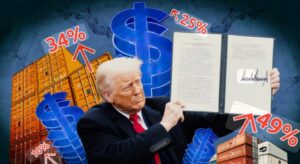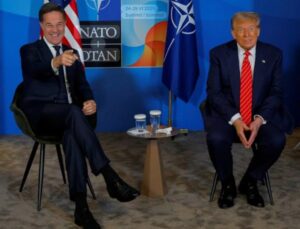Six Months of Trump as President : How “America First” Is Reshaping the World Order
Six Months of Trump as President : Six Months That Felt Like Six Years of American politics and 60 years of Global transition.
It’s only been six months since Donald Trump took office, but to many, it feels like an era already.
Daily Twitter storms, international clashes, controversial executive orders, and a style of leadership that breaks all norms — the Trump presidency is anything but traditional. But beyond the spectacle, the real question is: what impact has he made?
Here’s a look at how Trump’s first six months have shifted global politics, trade, and diplomacy.
Trade Turmoil: Six Months of Trump as President, He Tears Up Global Rules
One of the most immediate effects of Trump’s presidency has been on global trade.
In April, he launched a wave of reciprocal tariffs, targeting both allies and adversaries.
Trump’s message was clear: If you want access to American markets, manufacture in the U.S. — or pay the price.
This move disrupted the long-standing global trade consensus. Until now, trade systems were built on mutual understanding — that free trade generally helps all and that developing nations deserve certain protections.
Trump flipped this idea, forcing countries to choose: “Make in America” or face tariffs.
The consequences have been swift. Europe and India are negotiating a free trade deal. Canada is reopening trade talks with India. Southeast Asia is diversifying partnerships.
Trump’s tariffs haven’t just rattled old relationships — they’re creating new global alliances without the U.S.

Cracks in the Western Alliance: America Isolates Itself
After World War II, the U.S. led the Western alliance — with Europe and Canada standing firmly behind it.
But today, those bonds are fraying. Trump has accused NATO allies of “freeloading” and threatened to reduce U.S. commitments.
In response, Europe is moving towards strategic independence. European Union has launched a massive defense spending plan to reduce its reliance on American military support.
Meanwhile, Trump has had tense moments with Canada, even suggesting they should become the 51st U.S. state — an idea Canadians firmly rejected.
This growing divide means that U.S.-led global campaigns are losing their usual support.
In Ukraine, Europe wants a hard stance on Russia, while Trump pushes for peace talks. In West Asia, Europe criticizes Israel, while Trump backs them militarily.
The Western unity that once defined post-war diplomacy is splintering fast.

Peace for Applause: Trump’s Performative Diplomacy
In earlier times, peace deals were seen as diplomatic achievements built through quiet negotiation. Under Trump, they’ve become a stage performance.
Trump’s foreign policy seems more focused on winning a Nobel Peace Prize than creating long-term solutions.
Take the case of Iran: Trump let Israel bomb Iranian nuclear sites, then joined the conflict by launching heavy bomb attacks. When it was over, he claimed credit for ending a war he started.
A similar story unfolded in South Asia. After tensions flared between India and Pakistan, Trump claimed to have brokered peace — despite having little to do with the actual ceasefire talks. His priority isn’t stability, it’s spectacle.
Foreign Policy for Sale: The End of Free U.S. Aid in just Six Months of Trump as President
Trump’s “America First” approach has also turned traditional U.S. aid into quid pro quo deals.
Gone are the days when America provided assistance based on humanitarian need or strategic alignment.
Now, it’s all about the transaction.
Ukraine, for example, now receives arms only after agreeing to sell rare earth materials to the U.S.
Qatar even gifted a private plane to Trump — something that, in many countries, would be seen as a bribe, but is now just called diplomacy.
Trump has canceled $60 billion in foreign aid. Following his lead, Europe plans to cut another $70 billion. As these aid streams dry up, developing nations are left scrambling for new partners — and China is already stepping in.
The Great Retreat: America Abandons Global Leadership
While some countries, like India, may not mind a less involved America, the consequences are far-reaching.
When the U.S. steps back, a vacuum is created, and China is ready to fill it.
The decline in Western aid to Southeast Asia — down from $33 billion to $26 billion — opens the door for Beijing to increase its influence.
Trump has also pulled the U.S. out of key international organizations, including the Paris Climate Accord, the UN Human Rights Council, and is planning to exit UNESCO.
Each withdrawal leaves more space for China to shape global norms, especially in emerging regions that were once strongly aligned with the West.
A Presidency That’s Redefining Power
In just six months, Donald Trump has disrupted decades of diplomatic, economic, and political balance.
His “America First” doctrine is more than a slogan — it’s a radical shift in how the U.S. engages with the world.
Whether these changes lead to long-term success for America or accelerate its global decline remains to be seen. But one thing is certain — the rest of the world is no longer waiting.
Countries are moving ahead, making deals, forming alliances, and filling leadership roles that the U.S. is vacating.
The Trump era may have just begun, as six Months of Trump as President but its global impact is already impossible to ignore.
Read Also: US Tuition Controversy
